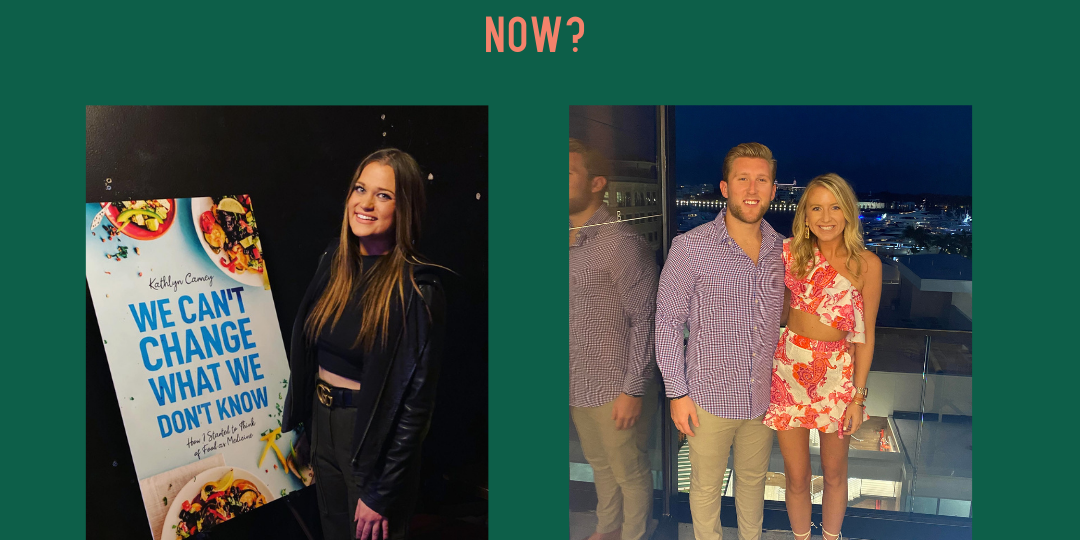In episode 4, Trish Churchill and Steve Elf talk about how fasting has been a huge part of their healing journey. They fasted for four days each month in an attempt to kill the cancer cells, or keep the cancer cells from multiplying, in Trish’s body. As I mentioned in the podcast and in my book, We Can’t Change What We Don’t Know: How I Started to Think of Food as Medicine, Trish and Steve were inspired to try fasting after reading Chris Wark’s book, Chris Beat Cancer.
In Chris Beat Cancer, Wark explains that fasting gives your body a break from its normal digestion because it goes from burning glucose to burning body fat. This could be helpful if you are trying to lose weight and if you are trying to kill cancer cells. When the body goes into this “starvation mode,” the cancer cells have a harder time adapting to this new environment. In addition, Wark also starts that fasting recharges the immune system, which can be helpful for anyone, but especially helpful for people who need the extra boost to fight cancer cells.

When I started my nutrition education graduate program at American University, I was eager to learn more about the benefits of fasting. Because of Trish’s original autoimmune disease diagnosis, I wrote my first paper on the impact that nutrition can have on preventing or managing autoimmune disease. I was pleasantly surprised by all of the research that indicated that fasting could prevent or manage autoimmune disease. In my paper, I wrote,
“Young Choi, Changhan Lee, and Valter D. Longo (2017) specifically studied the impact that nutrition and fasting had on the prevention and treatment of autoimmune disease (p. 4). The authors examined the impact that calorie restriction, periodic fasting, and fast-mimicking diets had on participants in multiple studies. According to Choi et al. (2017), calorie restriction is defined as “20-40% restriction of calories,” which they explain is a difficult regimen for many people to follow (pp. 5-7). The researchers concluded that even though the calorie restricted diet is hard to follow, it can be effective in preventing multiple sclerosis and managing diabetes in mice (Choi et al., 2017, pp. 8-9). An easier diet for people to follow might be periodic fasting, as it does not require as serious lifestyle changes (Choi et al., 2017, p. 5). After reviewing multiple studies, the researchers stated that periodic fasting might be able to kill autoimmune and cancer cells (Choi et al., 2017, pp. 5-7). Last, the researchers reviewed studies of fast-mimicking diets on mice and people. Choi et al. (2017) concluded that fast-mimicking diets helped manage multiple sclerosis in mice and humans (p. 8). Choi et al.’s research shows that different types of fasting aid in the prevention and management of different autoimmune diseases like multiple sclerosis and diabetes.”

I enjoyed this article by Choi et al. (2017) because it discussed the benefits of different types of fasting. If a four day fast isn’t realistic for you and your lifestyle, I was happy to see that there were other options. Additionally, in We Can’t Change What We Don’t Know: How I Started to Think of Food as Medicine, I discuss Dr. William Li’s recommendation to engage in calorie restriction. Dr. Li recommended that people skip breakfast or lunch a few days per week. This could be one way that people incorporate fasting without having to make big lifestyle changes. I know that when I have a really busy work schedule, I accidentally skip lunch because I am working through it.
There are many different types of fasting that you can engage in throughout the day to lose weight, prevent autoimmune disease or cancer, or change the function of cells. Fasting is just another tool that you can add to your tool kit when you are ready to make some diet and lifestyle improvements!
References
Burkhart, A. (2021, December 28). Fasting mimicking diet: What is it? does it work? The Celiac MD. Retrieved February 3, 2022, from https://theceliacmd.com/fasting-mimicking-diet-what-is-it-does-it-work/
Carney, K. (2019). We Can’t Change What We Don’t Know: How I Started to Think of Food as Medicine. New Degree Press.
Choi, I. Y., Lee, C., & Longo, V. D. (2017). Nutrition and fasting mimicking diets in the prevention and treatment of autoimmune diseases and immunosenescence. Molecular and Cellular Endocrinology, 455, 4–12. https://doi.org/10.1016/j.mce.2017.01.042
Fasting. (2020, September 28). Periodic fasting. Fasting.com. Retrieved February 3, 2022, from https://fasting.com/fasting-methods/periodic-fasting/
Intermittent fasting: What is it, and how does it work? Johns Hopkins Medicine. (n.d.). Retrieved February 3, 2022, from https://www.hopkinsmedicine.org/health/wellness-and-prevention/intermittent-fasting-what-is-it-and-how-does-it-work
Li, W. (2019). Eat to beat disease: The new science of how the body can heal itself. Grand Central Life & Style.
Wark, C. (2018). Chris Beat Cancer (1st ed.). Hay House, Inc.







